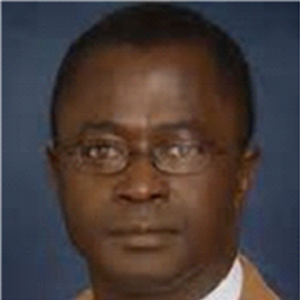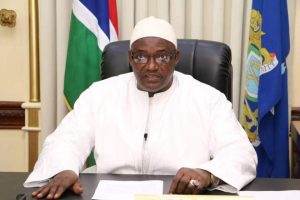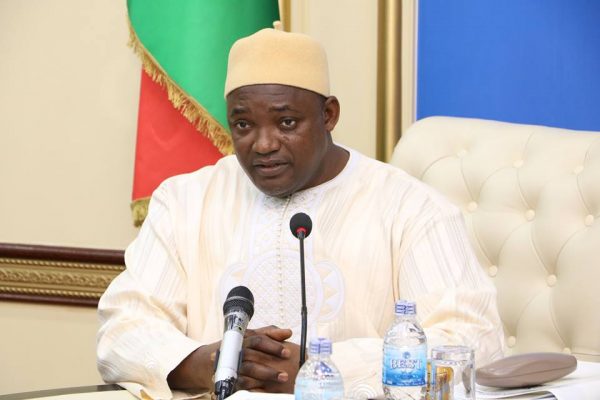
In the forward to The Gambia National Development Plan (2018-21), President Adama Barrow challenged us to do a lot of things, among which was to hold his government to account for their actions. Below is small section of what he said:
“I call upon all Gambia a to make this NDP their plan, to seriously interrogate themselves in how best they might contribute to its realization, and most importantly to hold us to account when we fall short in a constructive and positive spirit of nation building. I am convinced that the courage and determination shown by Gambians in defeating tyranny and oppression can be successful harnessed to also help us overcome our challenges and ensure that together we fully realise the vision and goal of this National Development Plan.”
This piece is an attempt to reflect on some of the recent activities of Barrow and his administration and ‘to hold him to account in a constructive and positive spirit of nation building’.
[It appears that the new political dispensation that replaced the dictatorship underestimated the hope-filled country they inherited; it still feels as though they are still on the honeymoon. It seems that they have been ill-prepared for the tasks even though most have been in opposition for years. What were they doing all those years?
The President and his team do not seem to have the conscious understanding that Gambians needn’t be told to hold them to account when they fall short; and I do not think his team have yet received the list of things they must accomplish – in 6 months, in a year or in 3 years with regular updates on achievements.
Some small progress, such as freedom of expression and of assembly, has been made here and there, if one compares the achievement of this government to the awful record before it. It is an understatement to say that much, much more remains to be done. For example, the government is yet to take on and make tangible progress on the big challenges: education, health, environment/food security, and infrastructure which are all in very, very pitiful states.
Some big announcements have been made on the back of pledges from donors. But an objective observer may come to the realisation that announcements made on the back of pledges tend to highlight the gullibility of a government and or government officials.
We must know that pledges are not commitments and some pledges come with so many difficult-to-meet conditions that they seem to be (deliberately) designed so that the conditions can never be met; consequently, the pledge may never become a commitment.
The government must realise that we cannot develop our country – a resource-constrained economy–through begging; we have to tie the laces of our boots and work our way out of our mess. What seems to make our situation particularly worse is that even when we get a bit of money from our friends, we seem to have the very odd tendency of spending much of it on misplaced priorities that do not yield improved livings conditions for the people; and we also spend the money on unregulated and, in many cases,upwardly adjusted per diems.
I think it can be argued thatmost of the claimants of the per diems bring back to the country much less than they take from the system in per diems. This is called legalised stealing and it must be restrained. And because time and legacy seem not to hold much currency forsome of these people, policy papers may be waiting to be either developed or actioned while they gallivant around the world.
Further, some of these people seem uninterested in learning what is good about the countries they visit or have been educated in and working to change the situation at home; they seem to be in it for the money, it is sickening. I think we must address these and other issues if we are really, really serious about developing our country.
Now, as the President and his team conclude their trip in China, attending the Forum for China-Africa Cooperation Summit, one wonders how much will be paid in per diems or whether he or any member of his team will receive any anonymous donations. More importantly, we must be mindful of the potential for a debt trap as China expands its loans to African governments and state-owned enterprises, which from 2000 to 2017 stands at $136 billion. I hope we will not be forced to surrender our natural resources or land if we default.]
When one revisits the NDP these days, one finds it a little hard to read beyond its cover page without being bombarded with thoughts/questions as to whether the government will deliver the wish list in the NDP. Yes, wish list; they are not priorities if they are more than 2 or 3. Given the direction of travel of the government, it seems increasingly apparent that the Consultants that put the NDP together may have been the winners after all, not the country. Time will tell.
Will political corruption, i.e., accepting donations from so-called anonymous donors become systemic in The Gambiaunder Barrow’s administration? It appears that our president needs to know, once again, that we will not expect and cannot tolerate any leader being involved in activities that cannot be fully accounted for – such activities are corrupt practices. These malpractices started with the donation of vehicles to NAMs (national assembly members) and GRTS and recently the donation of D11,252,000 to the pilgrims.
The government has never been able to give us the name(s) of any of the donors or adequately defend why these donations were made or had to be accepted. There is nothing of substance to take from the statement issued by the government Spokesperson Mr. Ebrima G Sankareh – that during the President’s visit to Saudi Arabia in June, 2018, “… some generous and anonymous Saudi philanthropist(s) promised (/pledged through the government of the Kingdom of Saudi Arabia) the Gambian President that they were going to generouslyconsider their Gambian Muslim brethren during this year’s pilgrimage”.
Mr. Sankareh appears to be very bad at spinning: he didn’t answer any questions about the dodgy money, but instead confused the issue and raised even more questions about the anonymous donation. How many “generous and anonymous individual(s)” was Mr. Sankareh talking about? Did the President meet these “generous and anonymous individual(s)” and where did he meet them? How and why– the real motive- did the “generous and anonymous individual(s)” make their promise?
Look, there is (usually) no such thing as a free lunch; it should be a concern to many people that this government may not deliver on good governance and accountability. It is concerning that the public expression of revulsion following the donation of the vehicles to the NAMs did not deter the President from accepting D11,252,000 from another anonymous donor. It is an embarrassment that most of the NAMs thought it acceptable to accept the vehicles. It shows how incompetent they are in holding the government to account; they must be held accountable for encouragingdishonest practices and for their indifference to them.
It is almost certain that the so-called anonymous donors whose names and faces may only be known to the President are only doing these seemingly thankful acts because they would want something in return, sooner or later. Why is it not obvious to us that the anonymous donors may sooner or later make more money from their “investments” than we received from them?

How quickly should we forget and forgive the President/government for seemingly forgetting about the accountability agenda on the front cover of the NDP, which reads “Delivering good governance and accountability, social cohesion and national reconciliation and a revitalised and transformed economy for the wellbeing of all Gambians”? I think it is appropriate to debate whether we expect the government to live up to some or all of this mission/vision statement.
Why should it be so difficult for the President to tell the anonymous donors that delivering good governance and accountability are at the heart of his government and that if the donors wouldn’t want their names to be made public, they should consider taking their donations elsewhere? Or why not tell them about the government’s wish list and encourage the donors, upon proper screening, to invest or work with some credible sector leads? Why is it difficult to diplomatically engage the donors – that their names shall have to beannounced – that their donation shall be spent on areas considered relevant by the government – in line with the vision set out in the NDP?
In that regard, could the vehicles donated to the NAMs and GRTS be used to better support other sectors, e.g. school buses? Our Leader must know that the donated D11,252,000 could have been used to address some of the decay in the health sector or provide start-up capital for promising entrepreneurs to help grow the economy; provide educational scholarships to train engineers, and architects.
In general, such actions may help spread out the narrow hand of the government so that the art of possibility and of hope can be widened, thereby opening up pathways that enable as many people as possible to sail into the world of possibilities than they had imagined. Surely, the pilgrims who went to Mecca did so because they could afford it, so they didnot need the extra money.
If the public wants to know about the anonymous donations, I think the government must come clean and tell us; it is not satisfactory for the President to tell us that “he would continue to serve the best interest of The Gambia and all Gambians in all his engagements,” as a response to our concerns.
It is unclear how D11,252,000 or the vehicles addressed the concerns of all Gambians. And Ms. Amie Bojang Sissoho(State House Director of Press and Public Relations) must know that, for a government and government officials, the issue of ‘anonymous donors’ has nothing to with confidentiality but has everything to do with corruption.
When it comes to promoting good governance and fighting corruption, public officials must do what is right to ensure that public trust in their capacity to serve the public is preserved,not undermined.
Therefore, Ms. Bojang Sissoho should not appear to encourage/condone wrongdoing by incorrectly invoking the oath (some) government officials take to keep confidential material confidential. There is nothing confidential about anonymous donations to a government or a President that must be kept under the carpet. No one is asking Barrow or any government official to speculate/reveal government secrets known to them. Are the anonymous donations state secrets?






The question Omar is what constitutes “state secrets” if any under our new found democracy. Really? How good are government officials at keeping secrets?
In their simple minds on top of apparent deficiencies at spinning stories, both Adama Barrow and his spin master Ebrahima Sankareh end up shooting themselves in the foot. There is also glaring evidence that again, in their simplistic thinking, the parties would believe that doling out cash to pilgrims in Mecca would buy them the sympathies and support of folks that they believe could be bought out. What better cross section of Gambian society would one find than the cohort of Gambian pilgrims Makkah to stage the craft? The actions are reminiscent of the PPP and APRC eras where the philosophy of Mbaalu Maakoye Laleh, Dinanu Lene Dimbaleh, outstretched hands saying Nso, Meye Ma abound. All amounting to the illusion that the electorate can be bought. Not anymore!
It appears that the same syndromes still linger in Gambian society and are being promoted in earnest by the Barrow-UDP government to the detriment of self -sustenance.
Gift giving, charitable giving and confidence building measures are all acceptable practices in most cultures but I will remind Gambians that we live in a Gambia where the average Gambian does not subscribe to charitable giving to lift people out of poverty but to take credit for measly giving that follows the NDEYSAAN. The giving is mostly in the interest of what’s in it for them.
The leadership in the BARROW government must understand that their idea of traditional and feudal society under which guise they operate doesn’t give them the authority to accept anonymous gifts and outright bribes in the name of the Gambian people. That amounts to outright graft and corrupt practices and I count myself as an exception to that. I also believe that Omar and many other well meaning Gambians do too.
1. Jawara had the Singhapore dream; it didn’t happen.
2. Jammeh had Vision 2020; it didn’t happen.
3. Barrow has NDP; it is unlikely to happen.
Why? Because their realisation is dependent on factors that are beyond the control of their administrations.
The author is RIGHT: until we devise plans that are dependent on our own efforts for their realisation, we will continue to waste valuable time in pursuit of dreams and unattainable wishes. That’s hardly the way to build a country.
4. The Gambia, being in the situation it is now, CANNOT and SHOULD NOT turn its back on assistance, whether financial or material, but it must insist on TWO things:
(A) that it alone decides how and where the resources are deployed.
(B) that for accountability to the citizens, the anonymity of the donor(s) be waived for members of the National Assembly or its relevant Select Committee.
The resources, though, must be deployed where they are needed most, but this administration’s understanding of where/what that is remains in doubt, as they continue to mis-spend our meagre resources.
5. The President’s Office should have nothing to do with gifts and donations from individuals, businesses or NGOs because this could compromise impartiality in the execution of functions of the office holder.
Perhaps, a government department should be identified for this purpose or a completely independent body be created for the purpose. All financial assistance should be remitted into the Consolidated Revenue Fund whilst materials, like vehicles, should be surrendered to a Central Planning Authority that would have up to date information on the resource situation of every department and distribute these gifts on a “needs to have basis.” This would lead to a more appropriate and maximum usage of resources, whilst ensuring that these materials are properly monitored to avoid public properties being transformed into private use.
6. It is difficult to understand why President Barrow and his advisers think it is fine to follow the very steps that Gambians opposed about the Jammeh regime. Why do they think that running a foundation that receives money on our behalf, but not accountable to us or our reps, is acceptable? Why do they think that we will fall for this nonsense that it’s a private initiative, when it is his assumption to public office that makes this possible?
Difficult as it may be to comprehend some of these decisions, at the moment, what seems apparent is that the notion that “A cow grazes where it’s tethered” is in full operation, albeit, “legally.”